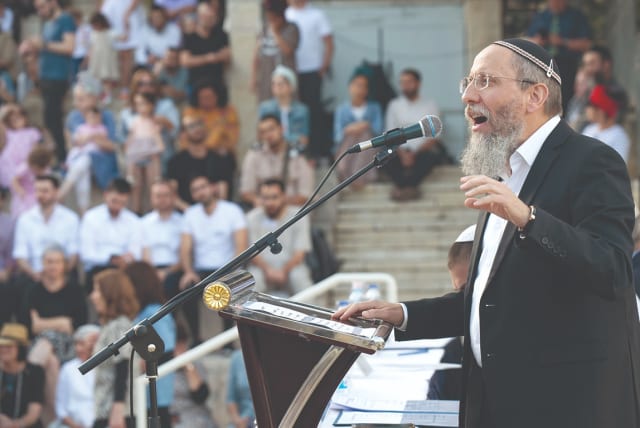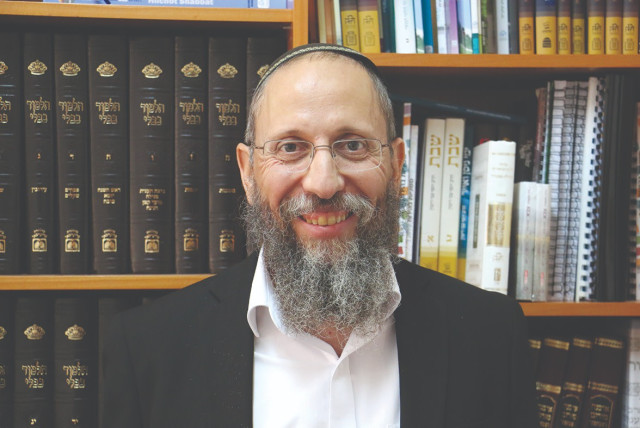Rabbi Yosef Zvi Rimon: Influencing the fate of millions with muscular dystrophy

JCT’s Rabbi Yosef Zvi Rimon shares his experience on Israel’s pharmaceutical committee.
One Saturday night while Rabbi Yosef Zvi Rimon was teaching a group of seminary students at his house in Alon Shvut, there was a knock at the door. Tentatively, he opened it and was greeted with dozens of faces looking at him expectantly. He apologized and said that he was busy teaching a class, but they pleaded that theirs was a case of pikuach nefesh – saving a Jewish life. In his role as the rabbinic representative on the pharmaceutical committee, that is a phrase he has heard very often. And something about this group struck him.
On his doorstep was a group of parents whose children have Duchenne muscular dystrophy (DMD). These parents brought their children to lobby Rabbi Rimon to approve an experimental medicine. The disease – the most common hereditary neuromuscular condition – usually manifests around the age of five with ALS-like symptoms. Children with DMD gradually lose the use of their hands, their ability to walk and even to drink. The most optimistic prognosis is that people with this disease may live to age 30.
Scientists have developed a new medicine that might delay the disease’s onset for up to three years. Meaning that a child will perhaps begin showing symptoms at age eight instead of five. The medicine is helpful but is not a cure. In Israel, a single injection for a five-year-old patient costs NIS 15 million. If there are 15 children who would be eligible for that treatment each year, that translates to a cost of NIS 225 million.
Rabbi Rimon is the rabbinic head of the Jerusalem College of Technology (JCT) and a member of Israel’s pharmaceutical committee. He said that although the committee wants to help these families and lessen the suffering of young children in unimaginable distress, the members must keep a bigger picture in mind.
In this case, it seems that there are better medicines on the horizon; if children take this current treatment, it is not clear if they will then be able to be treated with a future medication. Ultimately, the committee rejected the use of this particular drug.
“It was a very complicated decision,” Rimon said, and one that was “based on numerous discussions about the efficacy of the treatment. If it had presented a cure for the condition rather than a delay in its onset, it might have been given a green light – even at one-third of our [total] budget.”
This is just one example of how difficult – and at times distressing – the work of the pharmaceutical committee can be. “We have a budget of NIS 650 million,” the rabbi explained. They received more requests than can possibly be granted. “While we would say ‘Yes’ to everything if we could, sometimes we simply have to say ‘No.’”
Nineteen people – mostly doctors – make up the pharmaceutical committee. It meets approximately every six weeks, and there are usually two full days of consultation among the committee members, where they discuss each medicine for potential funding. The work is intense; each medication comes with approximately 100 pages of notes, meaning that the required reading stretches to some 6,000 pages for each two-day session.
“We give every medicine a rank,” Rimon explained. “If it receives less than an eight, we reject it and move on. If a prospective medicine receives an eight or nine, we are likely to view it more favorably in the next round of deliberations. The discussions we have are respectful, although highly animated. We talk everything through and try to convince the others of our positions.”
Anyone can ask the Health Ministry to subsidize a medicine — whether a doctor, a private physician, or a pharmaceutical company — but the committee never learns the source of the request. While the individual committee members may have biases in favor of medicines targeting certain diseases or conditions, they must explain how they arrived at a particular position. “There are rules about how we come to a decision,” Rimon said. “Principally, we need to understand how the medicine [under review] is better than a treatment currently in use.”
Does the pharmaceutical committee need a rabbi?
“The doctors on the committee are obviously the medical experts,” Rimon acknowledged, “but they are also very respectful of me and want to hear my opinions about things – like Jewish law – that are outside of their expertise and on which I am more knowledgeable than them.” They view having someone with a different perspective as important for the committee – and the nation. “We don’t have sources for everything in the Gemara,” Rimon explained, “but there are lessons in our traditional sources – ways of thinking according to Jewish law. When we extrapolate from them and apply them in making decisions, we can help shape the medical ethics of the Jewish State of Israel today.
“There was an example of a successful and effective cancer drug that can give people approximately three months more to live. One of the doctors said that the cost/benefit ratio of the drug was unacceptable. I told him that there was a famous discussion in the Talmud, in Bava Metzia 62a, about two people traveling in a desert and one of them had in his possession a flask of water. If both drank from it, they would both die. However, if only one of them drank, he would be able to make it out alive. The Gemara says that they have to divide the water because both will die. There is an interesting disagreement between Rabbi Akiva and Ben Petura. Rabbi Akiva argues that the one who has the water should drink, even though his friend will die, because you should put your life before those of others [in this situation]. Ben Petura takes the opposing view. Sometimes you don’t have a choice. Their disagreement is about which is more important – the probable saving of one life, against the elongation of one life vs. the shortening of another. “An extra month or two is important. Every day is important. Even a few hours more is meaningful. I said that we have to show sick people that we will try to do everything, even for a few extra hours,” Rimon said. “The committee found this approach very valuable, and they wanted more halachic perspectives.
JCT’s role in the decision-making process
In addition to his work with the pharmaceutical committee, Rimon is also head of the Jerusalem College of Technology’s yeshiva. He is not the only JCT faculty member who has been selected for this important role.
“JCT is privileged to have the Selma Jelinek School of Nursing. I have taught nursing students for years. I have always been drawn to the medical world. At the Jerusalem College of Technology, I always have the thought of combining the two worlds – Torah and science,” Rimon said. “Indeed, from a young age I wanted to be a doctor. I started studying in yeshiva and for the first four years, both my father and I thought that pursuing medicine was the correct path for me.
However, a conversation with the former rosh yeshiva at Yeshivat Har Etzion, Rabbi Aharon Lichtenstein, changed all of that. He told me that medicine is an act of chessed [loving kindness], but he urged me to continue along the path of Torah. ‘This is your mission in life,’ he said. I changed my direction, but those warm feelings toward medicine remain to this day,” Rabbi Rimon concluded.■
Jerusalem Post Store
`; document.getElementById("linkPremium").innerHTML = cont; var divWithLink = document.getElementById("premium-link"); if (divWithLink !== null && divWithLink !== 'undefined') { divWithLink.style.border = "solid 1px #cb0f3e"; divWithLink.style.textAlign = "center"; divWithLink.style.marginBottom = "15px"; divWithLink.style.marginTop = "15px"; divWithLink.style.width = "100%"; divWithLink.style.backgroundColor = "#122952"; divWithLink.style.color = "#ffffff"; divWithLink.style.lineHeight = "1.5"; } } (function (v, i) { });

